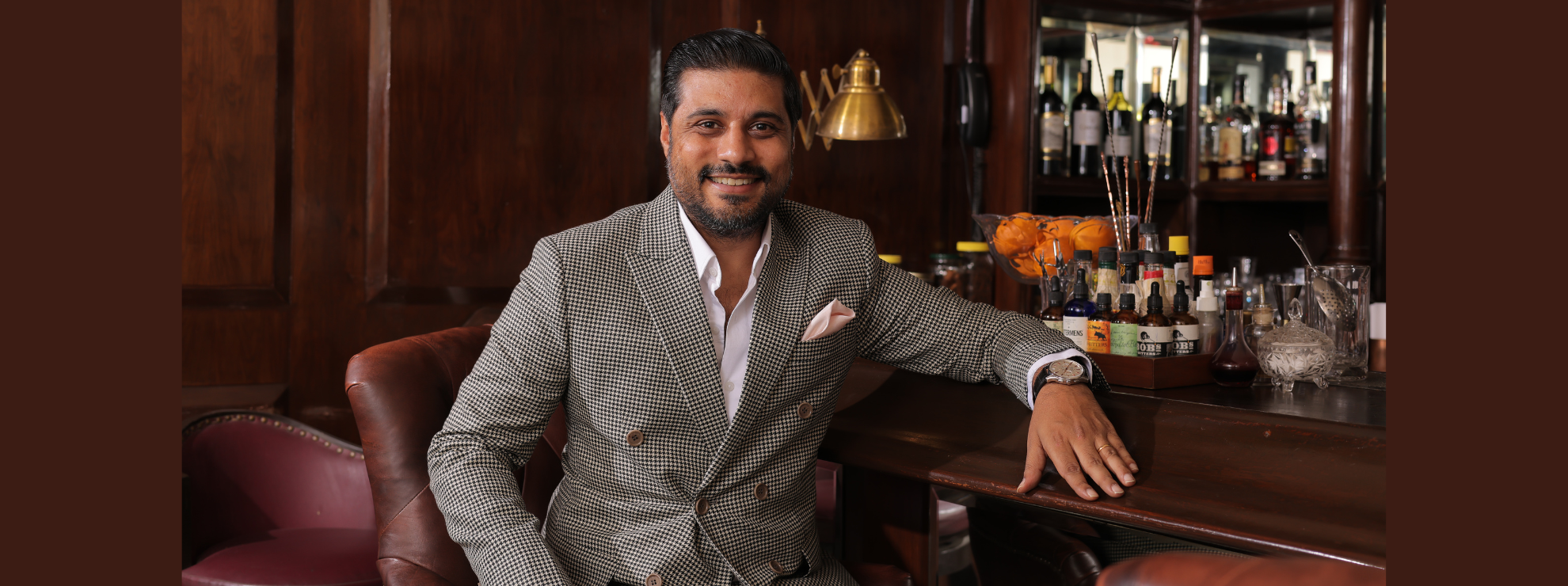July 28, 2024) With phrases like ‘Make in India’ and ‘Vocal for Local’ gaining momentum over the past decade, some locally made products make you sit up and take notice of the unusual ideas Indian entrepreneurs are working on. Successfully distilling a spirit made out of the agave plant, hitherto associated with tequila made in Mexico, is, Rakshay Dhariwal through his company, Maya Pistola Agavepura, India’s first 100 percent aged agave spirit.
Rakshay spent his childhood in several countries including Australia, Hungary, the Philippines and Singapore due to his father’s job with a cola conglomerate. Though Rakshay studied marketing and telecommunications at the University of Indiana in the US, his heart lay elsewhere. The fact that he had a reputation for throwing the best parties on campus hinted at his future calling.

Rakshay Dhariwal is making the full aged, first Indian agave spirit
Lord of the Drinks
In an exclusive with Global Indian, Rakshay Dhariwal reveals, “I returned to India after my senior year in 2006, wanting to start a cruise line. But the economy tanked soon after and I decided to launch Ayurvedic wellness centres across Delhi instead. Then in 2012, I realised we didn’t have any decent cocktail bars anywhere in India. I enjoy partying, and going out with friends and I’d noticed this trend in London. I decided to launch PCO – Pass Code Only – a cocktail bar fashioned like a PCO phone booth where you had to type a passcode to enter. PCO is in Delhi and Mumbai.”
Several hospitality-based ventures followed. Under the aegis of his holding company Pass Code Hospitality, Rakshay launched restaurants and bars like SAZ, Jamun, Mr Merchant’s, and Ping’s, across India. He owns and operates ATM, a private, members-only club and is also the Co-Founder of India Cocktail Week – India’s biggest cocktail festival. His latest role is that of Founder and Managing Director of Maya Pistola Agavepura (Pistola).
Rakshay Dhariwal observed that the wild Agave Americana grew profusely in the Deccan Plateau of India and is part of the family of plants from which tequila and mezcal are made. What began as a passion project blossomed into a leading agave brand redefining the alco-bev industry. Rakshay also did a course in alcohol distillation during Covid and launched variants of agave spirits.

By definition, however, agavepura is not a tequila. This common misconception stems from the widespread recognition of the term ‘tequila’, as opposed to an understanding of the larger agave category. Tequila is native to Mexico and its production is highly controlled and regulated by the CRT (Consejo Regulador del Tequila), the official body governing the production and distribution of the spirit.
Tequila can only be made and aged in five designated regions or appellations in Mexico, which means that you cannot label your product a tequila if it is not made in those designated regions in Mexico.
Indian Agave Variants
By regulation, tequila can only be produced from a specific subspecies of agave called the Blue Weber (also known as Agave Tequilana). Like Blue Weber, there are 150+ species of agave plants worldwide – and spirits produced from any of these species need to be called ‘Agave Spirits’ instead of the loosely used word tequila. At Pistola, the Agave Americana found in the Deccan Plateau is used to produce a pure aged 100 percent agave.
There are several variants of Pistola – Joven, Reposado, Rosa, Añejo, and Extra Añejo, connecting the globally popular spirit to its Indian avatar. When asked about the Spanish names of the variants, he says, “The Mexican tequila regulatory council lays down certain guidelines and classifications which we follow. An unaged liquid is called blanco, a mix of unaged and aged is Joven, a spirit aged between two months to one year is reposado. That aged for one to three years is Añejo and one aged for more than three years is called Extra Añejo. They also stipulate the kind of barrels in which the spirit has to be aged and we follow the same guidelines with our products.”

The spirit is distilled and packaged in Goa. Made from carefully selected wild Agave Americana plants aged 11 to 13 years, Pistola undergoes a meticulous production process that ensures authenticity and exceptional quality. After harvesting, the Piña – the heart of the Agave – is cooked using steam and high pressure to extract natural sugars. The resulting liquid is fermented in wooden vats with yeast, double distilled in a part-copper pot, and then aged in virgin American white oak, ex-bourbon, or ex-red wine casks. The spirit matures for different durations, depending on the variant and is constantly tasted to check if it has matured just enough. All the flavour comes naturally from the wood and char of the barrels. Finally, aged spirits from various casks are blended, non-chill filtered, and bottled without any artificial additives or colouring agents. The natural salinity in the air in Goa lends a rounded flavour to the spirit.
Just like it is with some of the finest whiskies and gins now being made in India, under Rakshay’s leadership, the spirit has garnered global acclaim, winning 32 awards. Currently sold in six Indian states and three international markets (United States, Thailand, and Singapore), he will soon expand his markets to include other states nationally and three more countries.
A Healthy Party Drink
A fact one would not associate with alcohol would be health benefits. Recent studies have shown that if one must drink, agave spirit, or its derivatives are the healthiest. Rakshay Dhariwal elaborates on why this is so. “We use the hearts of the plant during our distillation process, not the head or the tail. This spirit contains acetaldehyde, which is known to contain compounds that slow down your metabolism so you don’t get a hangover. It also contains probiotic properties which promote healthy gut bacteria, and has natural sugars with dietary fibre that help metabolism, lower blood glucose levels. It has fewer calories compared to other spirits and is carbohydrate-free. Which means it is safe for diabetics to consume as well.”
Having said that, how best is Pistola consumed? Does one have it like a tequila shot as shown in the movies – a lick of salt, a bite of a piece of lime and a swig of the drink? He clarifies, “The feedback we have received is that our spirit tastes way better than tequila and mezcal. It is best had with ice and water. You can drink copious amounts of it and still feel fresh. If you must add a bit of anything, I recommend the agave syrup. All my variants are used in signature cocktails across restaurants and bars. As for the traditional method, I recommend sprinkling a dash of cinnamon powder on a slice of orange and placing it on the rim of the shot glass. You take a sip and then a bite of the orange.”

Pistola spirits can be had with all cuisines though Rakshay asserts that they are known to complement spicy food the most. And since he has been immersed in cocktails for over a decade, is there a cocktail cookbook on the anvil? He concludes saying he has thought about creating a coffee table book on cocktails often, but time is of the essence and something of a luxury right now.
Top Five Cocktail Bars according to Rakshay:
- Bee’s Knees (Kyoto) – Hoji Tea Negroni
- Locale Firenze (Florence) – Mezcal Negroni
- Bar Termini (London) – Marsala Martini
- Native (Singapore) – Pistola Margarita
- PCO (Bombay) – Paithani
Also Read: Vahdam’s got the tea: How Bala Sarda built his ‘Made in India, for the world’ brand
Also Read: ‘Dram’a king: How Paul P John took premium Indian single malt to the world



